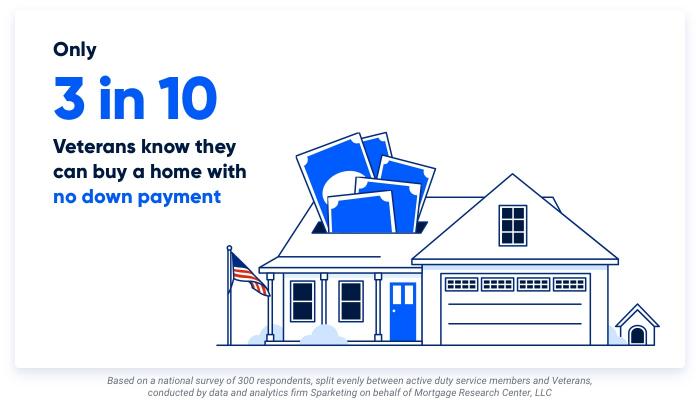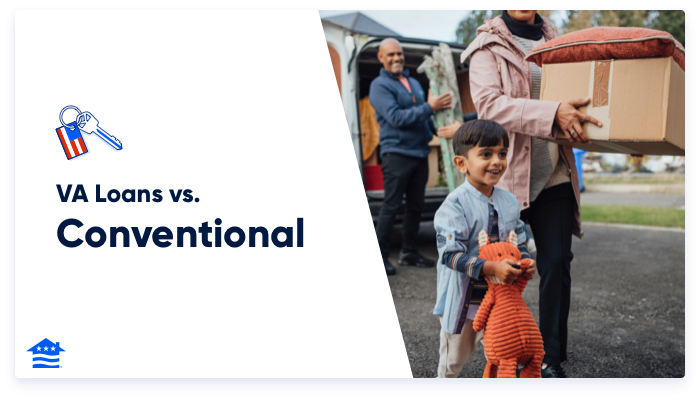Losing a loved one is never easy. In addition to working through their grief, surviving family members must deal with a whole host of financial concerns to pay off debts and settle the estate.
Families of Veterans who pass away often have questions about their VA loan benefits and are left wondering what happens when someone dies with a VA loan.
Here's what you need to know.
Will the VA Pay Off the Balance of the Loan When the Veteran Dies?
There's a common misconception that the VA will take care of a VA home loan balance if the Veteran dies before it is paid off. This is not true. The VA does not pay off loans after Veterans have died.
VA loans come with a guaranty, which is both a great benefit and a source of confusion for some borrowers and their families. The VA loan guaranty only covers the cost if the borrower defaults on the loan — that is, the Veteran has missed payments and the lender wants to foreclose. The VA loan guaranty protects the lender and makes it easier for Veterans to purchase homes, since the bank's risk of losing money is very low. But this guaranty does not pay off the loan in the event of the borrower's death.
Who is Responsible for the VA Loan?
When the Veteran holding the VA loan dies, the debt is treated like any other debt. If there was a co-borrower named on the loan, that person assumes responsibility. In many cases the surviving spouse is the co-borrower on the loan, but even if the surviving spouse isn't included on the loan, they will most likely assume the debt when they take on their loved one’s estate.
If there are no children or other relatives to claim your estate, it will be sold to repay your VA loan debt. The VA never gets involved in this process, and the debt is handled by the courts. Sometimes the borrower has life insurance that will cover the remaining balance of the mortgage, but that is not always the case.
VA Loan Assumption
To further support Veterans and their loved ones, the VA allows civilians to assume, or take over, an existing VA loan. So even if you are not in the military, a Veteran or surviving spouse, you may be eligible to assume a VA loan.
However, assuming a VA loan after death isn't automatic, and there are a few requirements. New borrowers need to have credit scores and income that meet the VA's guidelines, and they must assume all of the mortgage's obligations. They must also pay the VA funding fee, which is 0.5% of the remaining loan balance for VA loan assumptions.
A VA loan assumption is a great way to keep a loved-one's home after the Veteran’s passing. It can also be a good financial move, as you may be able to maintain the deceased Veteran’s interest rate if it’s lower than current market conditions.
Alternatives if the Mortgage Payment is Unaffordable
Assuming a VA mortgage can be expensive, especially if you already have a mortgage payment of your own. If you ever have trouble making payments on your VA loan, you may want to consider your options when it comes to affording this second mortgage.
Sell the Home
If you are not able to keep up with the monthly mortgage payments, your best option may be to sell the home. You may be able to avoid foreclosure or default if the home sells for more than what is owed on the loan. However, there is a chance that it could sell for less than what you originally paid, resulting in a short sale. It’s important to calculate how much you will profit from the home sale before beginning the selling process.
Refinance the Loan
Using a VA Interest Rate Reduction Refinance Loan (IRRRL) could help lower the monthly mortgage payment. A VA IRRRL allows those with an already existing VA loan to refinance into potentially lower interest rates or different mortgage terms. Both of which could help make the mortgage more affordable for the person taking on the debt.
Answer a few questions below to speak with a specialist about what your military service has earned you.
VA Loan Forbearance
If you're unable to make payments on the VA loan now but expect your situation to improve, you may be eligible for special forbearance from the lender. VA loan forbearance is an agreement between you and your lender about delaying your mortgage payments for a fixed amount of time.
Talk With a VA Lender Today
If a Veteran in your life has passed away, it's crucial to get in touch with their mortgage lender as soon as possible to get everything sorted out and avoid missing payments. Most VA lenders want to help borrowers avoid default and will work with you to accommodate your needs in a difficult time.
Related Posts
-
 VA Loan Down Payment RequirementsVA loans have no downpayment requirements as long as the Veteran has full entitlement, but only 3-in-10 Veterans know they can buy a home loan with zero down payment. Here’s what Veterans need to know about VA loan down payment requirements.
VA Loan Down Payment RequirementsVA loans have no downpayment requirements as long as the Veteran has full entitlement, but only 3-in-10 Veterans know they can buy a home loan with zero down payment. Here’s what Veterans need to know about VA loan down payment requirements. -
 VA Loan vs Conventional Loan: A Complete ComparisonHere we compare the primary differences between VA and conventional loans to show you when each option may be the best.
VA Loan vs Conventional Loan: A Complete ComparisonHere we compare the primary differences between VA and conventional loans to show you when each option may be the best.


